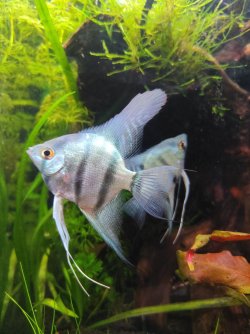AquaBlendPT
New Member
I have this breeding pair for some months now. All was good until I noticed they stopped eating. They don't eat for a week now. I tried everything.
Im sure they are sick because they just sit on the bottom of the tank, they poop white poop all day long and color is down. Also sunken belly or skinny belly..
All the other fish in the tank are fine which is what is driving me crazy. Or atleast they seem fine and eating.. Water parameters fine as well. I medicated the tank with Absolute Wormer + for one time already and waited 4 days. Nothing as changed.
I tried pellets, flakes, live food and frozen Brine with garlic and Sipirulina. I'm going crazy...
Please gimme some hope on this. I cant sleep because of them. I love them to much. Anything else I can try to make them eat? Should I medicate again? And again? Thank you in advance.
Im sure they are sick because they just sit on the bottom of the tank, they poop white poop all day long and color is down. Also sunken belly or skinny belly..
All the other fish in the tank are fine which is what is driving me crazy. Or atleast they seem fine and eating.. Water parameters fine as well. I medicated the tank with Absolute Wormer + for one time already and waited 4 days. Nothing as changed.
I tried pellets, flakes, live food and frozen Brine with garlic and Sipirulina. I'm going crazy...
Please gimme some hope on this. I cant sleep because of them. I love them to much. Anything else I can try to make them eat? Should I medicate again? And again? Thank you in advance.


